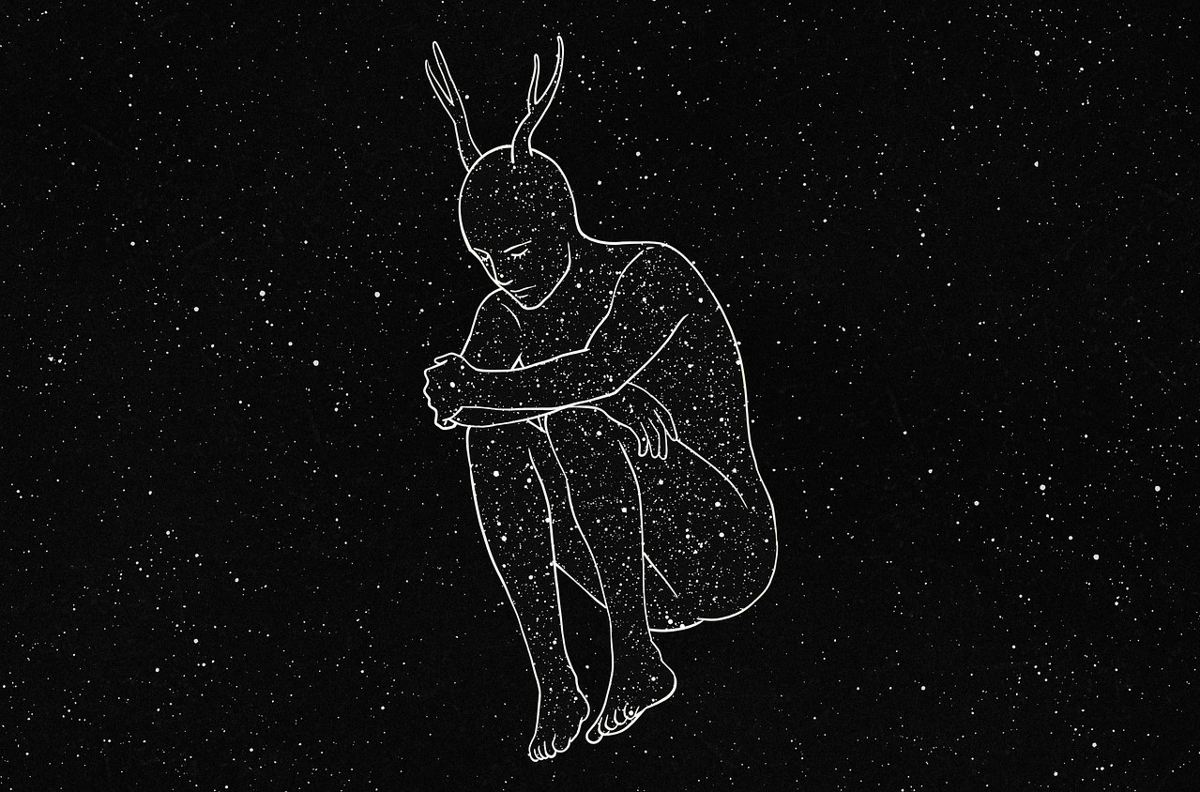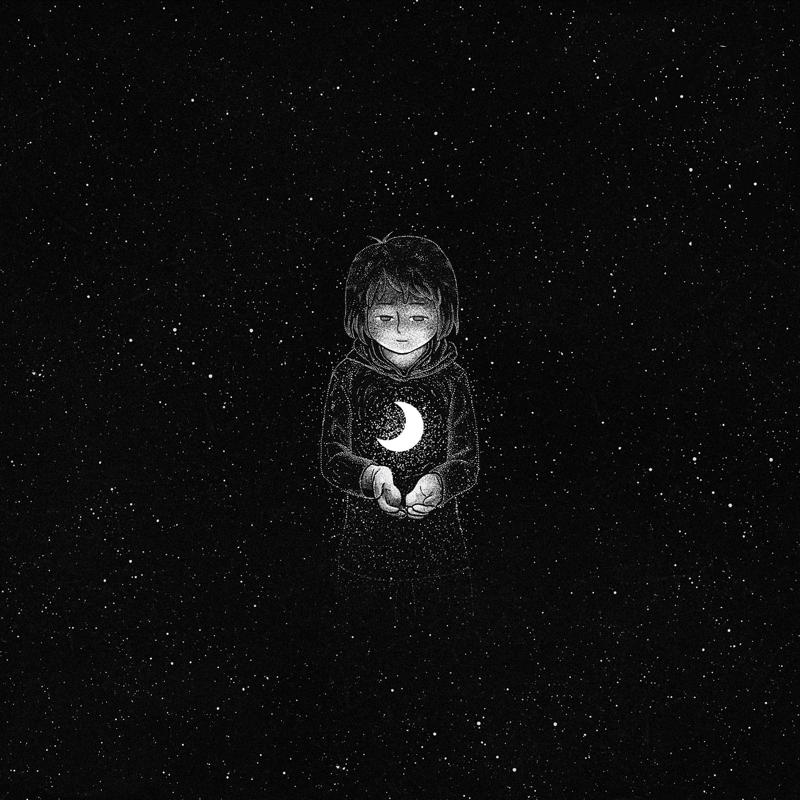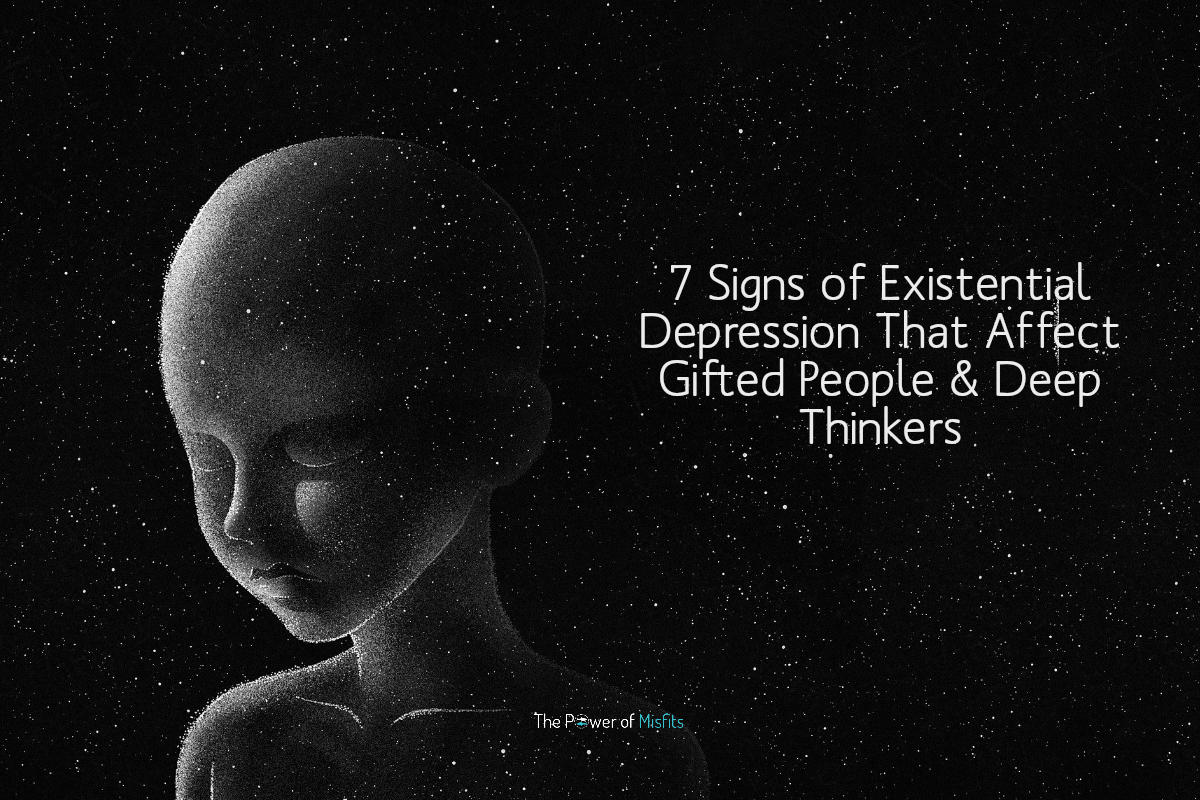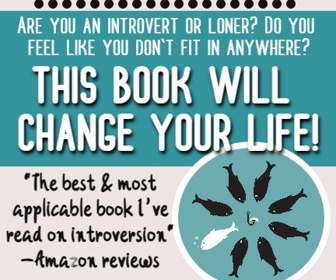Do you feel like your life doesn’t make any sense anymore? Do you constantly think about death and the meaning of everything? Are you reconsidering your values? You could be going through an existential crisis or depression.
What Is Existential Depression?
It is also known as existential anxiety, existential angst, or an existential crisis. It describes feelings of meaninglessness, isolation, despair, and deep frustration associated with existential matters.
A person who experiences this condition will think obsessively about the big questions in life, such as what the point of existence is, what happens after death, or what the future of human civilization is.
Existential depression may be triggered by emotional trauma such as the loss of a beloved person. But it also may stem from a sufferer’s mental setup.
There is research that demonstrates the prevalence of existential depression in gifted children and adults.
As such, according to psychiatrist Kazimierz Dabrowski and his Theory of Positive Disintegration, this type of depression is a necessary step for a gifted individual toward transferring to a higher level of consciousness.
7 Signs of Existential Depression
1. Feeling like everything is meaningless
When you find yourself in the acute phase of an existential crisis, everything ceases to make any sense. It’s the most telling sign of existential depression that produces some of the other symptoms.
You might continue with your daily routine and usual social contacts, but deep down, you feel that all this is utterly pointless. You feel like there is no real value or meaning in what you are doing at work or what you are discussing with your family and co-workers.
You constantly ask yourself,
“What’s the point in doing/saying this? What’s the point in waking up/going to work/having dinner?”
You feel burdened by the terrifying meaninglessness of everything.
2. Feeling isolated and detached from other people
Existential depression and isolation go hand in hand. You suddenly cease to feel the connection with other human beings, including your family and friends. It seems like you are cut off from everyone and all alone in your despair.
Yes, you may still take part in conversations and even attend social events if you are obliged to. But you are haunted by the feeling that you don’t belong there.
Being around other people makes it even worse. This is when you fully realize how isolated and detached you are. You watch other people socializing and having fun and feel like an outsider because you can’t join in.
Once again, you think about the meaninglessness of what they are doing. You wonder how other people are able to just live and enjoy themselves without being concerned about the issues that are torturing you.
3. Obsessive thinking about the big questions
When you are going through existential depression, you don’t just ponder the big questions. It turns into obsession. These queries are all you can think about.
Existential questions such as these ones could be tormenting your mind:
- What’s the point in living?
- What will happen after I die?
- Where are we heading?
- Is there any deeper meaning to existence at all?
You might also question your beliefs and values. It could feel like your whole life is falling apart because you no longer see any sense in your aspirations and goals.
4. Profound frustration with society, people, and life
Depending on what triggered your existential crisis, you could feel disappointed in modern society, humanity as a whole, or life in general. It could be that specific people have let you down, so you begin to reconsider the meaning of friendship and love.
You could feel repelled by the shallowness of today’s society and its values or angry with the stupidity of people. You ask yourself questions such as,
- Why is life so unfair?
- Why are people so stupid/shallow/mean/selfish/fake?
- Why is there so much injustice/evil in the world?
- Why is society so shallow/toxic/unfair?
There could be so many different scenarios, but they all boil down to one common trait – a feeling of profound frustration.
For this reason, you decide to isolate yourself from society, keep a distance from everyone, and just withdraw into yourself.
5. Feeling of despair because you can do nothing to change things
After frustration, there comes despair. The type of despair that stems from the fact that you can do nothing to change the state of affairs.
You can’t end all the injustice and evil, make people kinder and wiser, or bring society on the right track. And you absolutely can’t do anything about death and whatever comes after it.
It feels terrifying and desolating to realize that all you can do is sit and watch. You feel utterly small and powerless.
6. Low mood, unexplained sadness, a lack of motivation
A typical sign of depression of any kind is low energy and motivation. You find it difficult to keep up with your usual routine and mundane activities such as taking a shower and washing the dishes. You feel like you just have no energy to do these things.
You also suffer from low motivation, productivity, and inspiration for work even if you do what you love. You feel like you live under a cloud of unexplained sadness and emptiness.
7. Not finding your favorite activities meaningful or exciting
This symptom is also common in all types of depression, not just the existential one. Not only do you struggle to stick with your daily routine, but you also no longer find joy in the things that used to make you happy.
It seems like nothing can give you a sense of meaning, not even your favorite activities and hobbies. You keep asking yourself,
“What’s the point in drawing/watching movies/going for a run?”
7 Traits of People Who Are Prone to Existential Depression

According to Dabrowski’s Theory of Positive Disintegration, specific types of gifted people are more prone to existential anxiety and depression. They are sometimes referred to as trailblazers. They share a few common traits:
1. High perceptiveness
First of all, a person who is prone to existential angst is someone who can feel, notice, and perceive more than the average human.
They will pay attention to things that an ordinary person would skip as unimportant. They will perceive the nuances of other people’s behaviors and spot the inconsistencies.
2. Abstract thinking
Abstract thinkers are particularly susceptible to this type of depression because they think in terms of ideas and theories. They always see the bigger picture and notice patterns between seemingly unrelated things.
Thus, they often ponder global and existential issues, unlike someone who is focused on their daily life and immediate environment.
3. Emotional sensitivity or intensity
It’s the type of person who takes things to heart. They just can’t relax and “take it easy”. They feel everything too deeply.
For this reason, these people can’t take existential matters and global problems lightly. They genuinely worry about things such as the future of human civilization and the meaning of our existence.
4. Independent thinking
Another trait of those prone to existential depression is freedom of thought. It’s an independent thinker who relies on their own judgment rather than public opinion. They don’t follow the crowd or act in a certain way just because they were told to.
This type of person always filters information through the prism of independent and critical thinking. They never stop doubting.
5. Enquiring mind
It makes sense that someone who constantly asks themselves “Why?” can sometimes dwell on existential problems.
Such people are never satisfied with a superficial explanation of things – they want to delve into the very essence of everything. They seek to solve the mysteries of life, and they never stop learning.
6. Seeking justice and the truth
This deep thinker is profoundly affected by all the injustice and unfairness that exist in our world. It’s because they have a natural tendency to seek the truth and justice in everything, even when it goes against the majority.
It’s not a person to tolerate lies and hypocrisy. And, of course, they won’t act fake. This obsession with the truth can lead them to deep disappointment in people and society.
7. Feeling cut off from society and other people
As we said above, a feeling of isolation is among the major signs of an existential crisis. But for some people, it’s a lifetime companion.
They have an inexplicable difficulty relating to other human beings and enjoying the connection. They usually play the role of an outsider in social settings.
During childhood, they feel cut off from everyone, unable to enjoy group activities and interactions with their peers. These deep thinkers typically have no interest in the things that fascinate the people of their age.
How to Cope with Existential Depression?

Now, the question is, how to overcome an existential crisis? How do you go on with your life under a cloud of existential dread?
1. Allow yourself to experience it
It can be scary to face your own darkness. It is equally scary to question your own existence and everything you’ve known.
That’s why many people who are having an existential crisis are trying to hide from it. They are busy distracting themselves with nonsense and pretending that everything is all right.
Guess what? It doesn’t work. It only provides temporary relief. When you suppress your negative feelings and shy away from your concerns, they don’t just go away. Be sure that they will soon strike again.
So if you are going through existential depression, allow yourself to fully experience it. Don’t ward off the uncomfortable questions that are boggling your mind.
If you are a deep thinker or gifted individual who has the traits described above, face the fact that existential angst will likely be your companion for a lifetime.
Instead of combating it, make peace with it. Accept it as a fact that you will sometimes disconnect from reality and travel to the realm of dark existential thoughts.
2. Express yourself in creative ways
Existential darkness can be a powerful driving force for creative expression. Many prominent artists, poets, authors, and composers used their depression as a source of inspiration.
Moreover, when you put your existential concerns into a creative pursuit, it also has a liberating effect on your psyche. You can almost physically feel how the burden falls off your shoulders. No wonder it’s called expressive therapy.
Pick a creative endeavor and communicate your thoughts and feelings through it. It may be painting, photography, poem writing, or even dancing. It doesn’t matter what it is – the point is to feel able to express yourself through this activity.
3. Start a journal
Putting your feelings into words is no less powerful than expressive therapy. It’s a way to release your feelings of despair, isolation, and frustration.
Journal writing is especially recommended if you have no one to talk to about the existential problems that occupy your mind. It will help you make sense of your feelings and thoughts.
Just like expressive therapy, it allows you to at least partly free yourself from the burden of existential thoughts. If you introduce journal writing into your daily routine, you will soon feel like you are talking to a good, understanding friend.
4. Don’t go through it all alone
When you find yourself in the midst of an existential crisis, it’s easy to isolate yourself from the whole world. You may feel like no one understands you anyway, so it doesn’t make any sense to talk to your family and friends about it.
Believe me, it does. Even if your loved ones can’t identify with your concerns, they will at least listen to you. And it does help. Talking it out is a liberating act in itself. Being listened to also has a soothing effect as it makes you realize that your loved ones care about you and you are not alone in your struggle.
Please mind that in certain cases, it’s a good idea to seek professional help. Does your existential depression persist for months? Do you struggle to keep up with the most trivial daily tasks? Do you make suicidal thoughts?
If it sounds familiar, then you might want to turn to a mental health professional for help.



